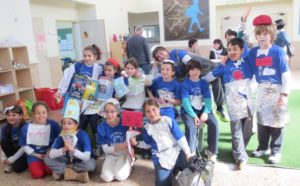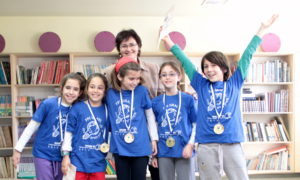
These creative 4th graders are learning the essentials of FPS: HOW to think
Photo provided by: Avivit Shapir
It is the week before Passover and a class of fourth graders from Shechanya Elementary School in Misgav in the lower Galilee is hiking up Mt. Tavor. At 562 meters, it’s a challenging climb. During the climb, teacher Avivit Shapir overheard this conversation between two of the students:
“Wow, how hard it is to climb this mountain— it’s a real challenge!”
“Yes it is. What can we do to make it easier?”
“How about robotic shoes? With robotic shoes you can climb faster.”
“What about a cable that runs to the top?”
“A cable is a great solution, but if we think about what solution will least disturb the environment, this will not get a high rank because it will wreck the view and the environment.”
“You are right- that solution would get a low grade in FPS Step Five.”
FPS stands for “Future Problem Solvers” a program designed to engage students in grades 4-12 in creative problem solving. In short, “FPS students learn how to think, not what to think.” Over 250,000 students are involved internationally in Australia, Canada, Hong Kong, Japan, Korea, Malaysia, Portugal, New Zealand, Russia, Singapore, Great Britain, Turkey, India and the United States. Thanks to the vision and energy of Avivit Shapir and the mentoring skills of Cheryl Whitesitt, Executive Director of Future Problem Solvers Program of Minnesota, you can now add Israel to the list of participating countries.
For over a decade Avivit Shapir, her husband Nir, and their three daughters lived in St. Paul. From 2000-2010 Avivit taught Hebrew at the Talmud Torah of St. Paul. She was a gifted teacher, beloved, extraordinary. She was also my colleague and remains my dear friend. This week Avivit shared with me how she brought FPS to Israel and proudly detailed the successes of the programs first year.

Victory is sweet for Avivit Shapir and her Future Problem Solvers students, February 2013.
Photo provided by: Avivit Shapir
Avivit got acquainted with FPS in St. Paul through her daughters, Yuval and Ofek. Both girls participated FPS in their public schools. Avivit saw how much they loved it, “I participated many times as a volunteer parent at competitions. I saw the kids excitement, how much this interested them, how they learned to think differently. I loved this!”
The family returned to Israel in 2010, settled in the lower Galilee village of Yuvalim, and Avivit began teaching fourth grade at Shechanya Elementary School. Says Avivit, “One day I asked Ofek a question about something, and I was amazed by how original and creative her answer was.” Ofek shrugged off the praise, saying “Mom, I was in FPS. I know how to think.” Avivit continued, “Not only did Ofek learn and enjoy the program when she lived in Minnesota, but she brought the techniques with her back to Israel.” Yuval continues to participate in FPS with her Roseville HS team, working remotely from Yuvalim.
At the end of the last school year, Shechanya’s principal spoke unprompted about the importance of helping students develop their critical thinking skills, “to teach them how to think, not what to think.” Bingo— the motto of FPS! Avivit proposed teaching an FPS course the coming year; the principal agreed, and Avivit contacted Cheryl Whitesitt, with whom she was acquainted from her time as an FPS parent volunteer in Minnesota.

Cheryl Whitesitt, Executive Director of Future Problem Solvers of Minnesota was instrumental in bringing FPS to Israel.
Photo: Cheryl Whitesitt
Cheryl was eager to mentor Avivit and the two conducted training sessions via Skype.
Last fall, the program was ready to launch. Starting with sixteen strong 4th grade students, Avivit aimed for a final group of twelve: three teams of four. Students were eager to participate, despite the large amount of work involved. The students meet with Avivit for 45 minutes, twice a week. They learn a six step process for problem solving, then use that process to grapple with the topics that FPS has selected for the year.
Competition takes place at the regional, state and international level. This year’s topic for regional competition was “Mega-cities”: What are the issues and problems that arise in cities of ten million or more inhabitants? The topic seemed fantasy-like for kids who live in Yuvalim and the tiny villages and kibbutizim nearby. Israel’s population of seven million is far less than any mega-city. Another challenge— there were almost no resources on “Mega-cities” written in Hebrew. How could the kids do research?
Undaunted, Avivit took English language materials sent by Cheryl, and with the help of a corps of volunteers—parents, grandparents, neighbors, colleagues, and Yuval and Ofek—translated the materials into simple Hebrew. Besides assisting with translation, parents have eagerly helped with everything from judging competitions to creating an FPS-Israel t-shirt. Avivit has invested a huge amount of her own time as well. There is even a local volunteer- Riva Nolley of Talmud Torah of St.Paul, translating competition materials from English to Hebrew.

Yuval Shapir has served as both a translator and evaluator for FPS Israel, and continues to compete with her team from Roseville HS.
Photo provided by: Avivit Shapir
After learning the six-step process and researching the topic, teams were ready to compete. They were given a futuristic scenario related to the topic. Their task? Brainstorm the possible problems, devise sustainable solutions, then present an action plan in skit format. Their work was also submitted in writing. Kids did the work in Hebrew and parent volunteers translated the work into English. Yuval, trained by Cheryl as an evaluator, evaluated the work in Hebrew, Cheryl evaluated the translation.
Avivit’s teams took part in the regional “Mega-cities” event, competed against each other, and were ranked 1-4. Then their scores and ranking were compared to Minnesota rankings. “That was the exciting message I was able to give Avivit”, said Cheryl. “Each one of her teams ranked high enough that they compared to every one of our teams that received an invitation to the state competition.” Their skits can be seen on the Israel page of the FPS-MN website.
The state competition will be Saturday, April 6, with Avivit’s teams competing on Sunday, April 7.
The topic? “Ocean Soup”, an area of the North Pacific polluted by remnants of plastic which are contaminating the water and wildlife.
Although it was decided in Israel that the Israeli teams will not travel to the International competition in June this year, they will still study the topic: “The Status of Women in the World”. Students will continue next year and a new level will be added in 4th grade, with Avivit teaching both.
Said Avivit, “My vision is an FPS Israel center, with enough money for translators, as well as a coordinator. I want this program to reach other schools in Israel, to train other teachers in its use. This program is in many countries around the world, but in the Middle East, it is only in Turkey and Israel. No Arab country is doing this. In our region there are many schools that serve the Arab population. I would just love to bring this program to Arab-Israeli schools in the Galilee. But in order to do this I would need a budget and someone who is fluent in Arabic, with loads of passion and ideas.”
Cheryl is equally enthusiastic. “I see Avivit working so hard and telling so many people about it. They really are going to grow this opportunity and teach these skills to so many kids.”
Reflecting on the hike in Mt. Tavor, Avivit concluded, “This was a peak moment, seeing that the students could apply the FPS techniques to every day life.”

